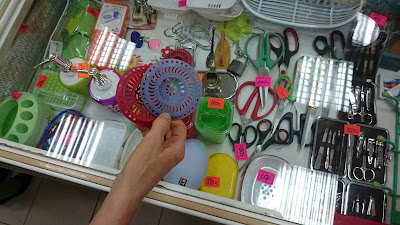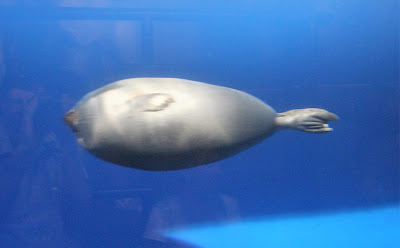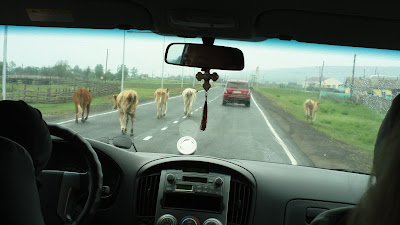That night in the beginning of July was short, and the
twilight on the left-hand side of the plane never allowed the night to fall. We
had left for the East from the crowded Domodedovo airport of Moscow at about
midnight and arrived in the sunny
Irkutsk after a five hours’
flight, late in the morning. The time difference shortened our night to the length of the flight.
The car sent by the school weaved its way through the empty
streets, passed by modern business premises: “The school is over there!” – and
continued along the broader streets to arrive in a few minutes at the hostel’s court. We had arrived, together
with a reasonable amount of luggage. We received our keys at the reception and climbed up to the 3rd floor.
A
living room with a kitchenette, a bedroom and a bath. The flat had a newish
washing machine, as we wished. The kitchen had fairly new household appliances
– put cleaning equipment on the shopping list. A second-hand shower cabin had
been installed in the bathroom. There was warm water, but the tap handle
remained in my hand and water did not flow away. – No problem, the girl from
the reception showed how to handle the shower. She threw the rest of the sodium
hydroxide down to the drain – add NaOH and a hair filter to the shopping list.
I was tired and it was hot, but we left for a walk in the town and had a late lunch in the
air-conditioned and nearly empty “Buono”, downstairs from the school.
We were in Siberia! Here we would live for the next three
weeks, frequent the Russian classes
in the mornings, visit the town in the afternoons and the region of the River Angara the Lake Baikal during the
weekends.
M. was running the School and she did it very well. The
lessons were pragmatic and the grammar was not too much emphasised. A. got
private lessons, sometimes with two teachers – a journalist and a language teacher. I started with vegetables
and seeds: In the afternoon, we made a tour with M. in the market hall. Every
morning the participants told what they had done the day before. During the breaks,
we tasted Siberian berries and cakes with tea.
The tuition took place in small groups. During the first
week, there were only the two of us. The week after a third student joined and
later still one more. The latest comer was an absolute beginner, needing time to recover from jetlag
and take first steps in learning Russian.
Commonly language teaching takes place in groups of one
teacher and one or several students. It was the first time for me to learn in a group where
the number of teachers was sometimes higher than the number of students. It was
an interesting experience, but of course more expensive for the organisers than
the traditional student-to-teacher
ratio. In a way, learning in a group with more than one teacher is closer to
“natural” environment of language learning: good advice and examples are
available from several native speakers.
In addition to the morning report, the following themes were dealt with during the lessons:
- History of Siberia and Irkutsk
- Russian education system
- Free time activities
- Way of dressing
- Economy
- Festivals
- Sightseeing
- Family relations
- Illnesses
- Housing.
Typically, there was a pre-prepared vocabulary on each topic
and conversations according to the skills of the participants. Thanks to the
small size of the groups and the number of teachers, the subjects were
discussed together. The native
speaker teachers had patience to support the less skilful learners.
The teachers were assisted by local experts on several
topics. For example, a fashion specialist gave an introduction on the way of
dressing, a trained engineer who had become a partner in a gym on free time
activities and an economist supporting his family by trading on the economy. Of
course, each visit of an expert was started by an introduction of the
participants, so the less advanced learners were also able to practice their
Russian, even if the vocabulary of the experts was not yet in active use.
After recovering from the first days’ exhaustion, the life
found its regular rhythm: A breakfast after the wake-up in the hostel, then a
20-minute walk through the town centre
and the lesson starting at 9.00. At noon, several restaurants served a business lunch. We enjoyed the lunch
most often in “Prego” or in “Bueno”, both serving tasty soups, salads, blinis,
main dishes, deserts, fruit juice and good espresso for a little more than 10
euro per person.
Irkutsk was said to be founded in 1652. The natural building
material was, of course, Siberian wood. Even today, wooden buildings dominate
in several districts, sometimes in a rather poor condition.
On the other hand,
the Europa House and the touristic entertainment area are well maintained, with sugary details of
wooden architecture.
The most charming, however, are the neglected lace-like
windows of the schools and houses of the popular districts.
Opposite the hostel, there was a public well where the local inhabitants gathered to discuss together in the evenings, indicating that not all houses are served by the municipal water-pipe.
Opposite the hostel, there was a public well where the local inhabitants gathered to discuss together in the evenings, indicating that not all houses are served by the municipal water-pipe.
The wealth of Irkutsk was originally emerging from the
hunting of sables, from the transport of Chinese tea to Western-Russia and
further to Europe and from the extraction of minerals. The luckiest and
craftiest businessmen got rich and also built stone houses in the town.
The
most recent architecture is represented by the steel and glass block of the oil
company.
Hunting and trade brought wealth to Irkutsk, but culture was
brought by the prisoners. The organisers of the 1825 Dekabrist Revolt belonged
to the most civilised Russian upper
class. After the unsuccessful revolt, the leaders were transported for months
from Saint Petersburg, avoiding the biggest cities, to serve their sentences in
Siberia.
After the prison sentence and forced labour, deportation continued for
many. The culture was brought by the wives and daughters of the deported.
Dekabrist Wife has earned the meaning of fidelity and persistence in the
Russian language – and a statue in the park of the Dekabrist Museum.
The programme of the language course included several visits
to Irkutsk’s museums after the morning lessons. During the weekend, there was
an opportunity to visit the Taltsy open air museum by a hydrofoil. The original dwellings of the Siberian tribes, exhibited in the museum, looked like wigwams and they were covered with tree bark.
More
recent dwellings are very similar to wooden farmhouses in western Russia. Some
of the buildings currently situated in the museum were rescued from the
reservoir built in the valley of the River Angara; entire villages needed to be
abandoned when the water level in the river was raised by the dam. - Like in
other Russian open air museums, the visitors were served with music, plays and
traditional snacks. It was a long time since I last walked on stilts!
Excursions to the Lake Baikal and to the mountains were the
highlights of the language holiday. We visited Listvyanka three times, once by
ourselves and twice with M. The ringed seal of the Lake Baikal was the most
sympathetic of our new acquaintances.
We did not meet these animals in the
nature, but saw a few both in the Listvyanka natural history museum and in the
drill show. Compared to its relative living in the Lake Saimaa in Finland, the
situation of the ringed seal of the Lake Baikal is much better: the size of the
population is around 100000 and there is a plenty of fat fish in the lake for food.
M. knows the shores and the slopes of the Lake Baikal where
she had been trekking with her family for years. A half-a-day ramble by the
lake with her was an unforgettable experience.
First we took a mini-bus from Irkutskt to Listvyanka and
then changed to a hydrofoil that took us to the port of Bolshiye Koty. The
walking trail followed the sea shore for about five kilometres and mounted to a
viewpoint.
At the turning point F. - a son of the Alps - manoeuvred on a few square metres’ ledge so that my knees were trembling even when I took a photo of him.
At the turning point F. - a son of the Alps - manoeuvred on a few square metres’ ledge so that my knees were trembling even when I took a photo of him.
Apart from the mount at the
turning point, it was an easy walk, but the paths were stony and the steps
needed to be set carefully. Partly the route
was using the beaches of the Lake Baikal; there were safe places foreseen for a
fire and even a heated sauna on the way. We ate our sandwiches and M.
demonstrated the purity of the water by filling her bottle in the lake and
drinking it on the way.
We had a good
opportunity to prove the Finnish origin of small and round cheesecakes to a
jolly group while waiting for the ship with our tea cups in Bolshiye Koty on
our way back.
On our return trip, we had a chance to travel by the Bargus,
a vessel designed particularly for the conditions of the Lake Baikal by the
Soviet engineers.
Bargus took us back to Irkutsk and there was no reason to
worry about the port facilities: the bow on the sand, the drawbridge down – and
here we go!
Our excursion to Arshan, in the Republic of Buryatia, took
the entire day, even if, instead of using the public transport, we rented car
with a driver. The distance from Irkutsk is superior to 200 kilometres and the
roads do not allow high speed for some parts of the journey. In the plain lands
of Buryatia we saw enclosed field and cattle lying and ruminating on the
street.
Arshan is a spa at about 900 metres from the sea level, and
the healthy composition of the water of its mineral wells was detected at the
end of the 19th century. In the 1920’s, for example, some wounded of
the red Army were treated in the sanatorium.
The village was full of tourists and it was even difficult
to find a parking slot. We walked through the spa area and visited the most
important sights: a waterfall at a quarter’s hike, a Buddhist temple and a
large market of souvenirs.
The offer showed that we were not far from Mongolia
– L. received a pink pair of Mongolian socks from camel wool. At lunch, we witnessed
the mystery of transubstantiation when the ordered ‘pozy’ was delivered as a
common hamburger.
Nature and markets were present throughout the journey, and
the driver found a good deal on our
way back: we had to rearrange our luggage to make more space for the two
buckets of fresh mushrooms.
Three weeks after our arrival to Irkutsk it was time to go West again after a
couple of days in Moscow. It was easier to adapt to the jetlag when coming from
East to West, but towards the end of the first travelling day it was difficult
to keep my eyes open in the Historical Museum. This creature appearing in the vitrine helped.
In Finland, there is a saying that “Siberia gives (or rather teaches) a lesson”. We learned a bit of
Russian and history, but in particular we learned to appreciate the nature of the Lake Baikal, and to
proportion the little we had seen to the long distances and the large
wildernesses. I also learned that Russia is Russia also far away in the East.
Irkutsk does not differ significantly, for example, from Petrozavodsk as far as its size,
population and town life are concerned.




























No comments:
Post a Comment